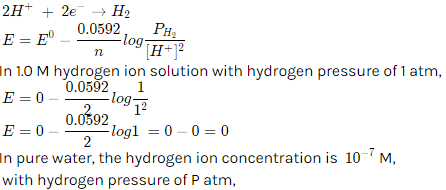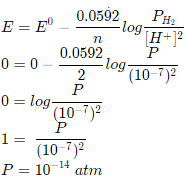NEET Exam > NEET Questions > The pressure of H2 required to make the poten...
Start Learning for Free
The pressure of H2 required to make the potential of H2-electrode zero in pure water at 298 K is :
- a)10-4 atm
- b)10-14 atm
- c)10-12 atm
- d)10-10 atm
Correct answer is option 'B'. Can you explain this answer?
| FREE This question is part of | Download PDF Attempt this Test |
Verified Answer
The pressure of H2 required to make the potential of H2-electrode zero...


Most Upvoted Answer
The pressure of H2 required to make the potential of H2-electrode zero...
The potential of a hydrogen electrode (also known as the standard hydrogen electrode or SHE) is defined as zero by convention. In order to achieve this potential, a specific pressure of hydrogen gas (H2) is required at a given temperature. Let's break down the question and the answer to understand why option B is correct.
Given information:
- Temperature (T) = 298 K
- We need to find the pressure of H2 required to make the potential of H2-electrode zero in pure water.
Explanation:
To understand why the pressure of H2 is required to make the potential of the H2-electrode zero, we need to look at the half-cell reactions involved in the hydrogen electrode:
Half-cell reaction:
H2(g) ⇌ 2H+(aq) + 2e-
The electrode potential is determined by the ratio of concentrations of H+ ions to H2 gas. At standard conditions (1 atm pressure and 298 K), the concentration of H+ ions is 1 M (mol/L). In order to achieve a potential of zero, the ratio of concentrations should be 1:1.
Therefore, the pressure of H2 required to achieve this ratio can be calculated using the ideal gas law:
PV = nRT
Where:
P = pressure of H2 (in atm)
V = volume of H2 (in L)
n = number of moles of H2
R = ideal gas constant (0.0821 L.atm/mol.K)
T = temperature in Kelvin (298 K)
Calculation:
Since we are given that the pressure required is in atm, we can assume that the volume of H2 is 1 L (as the volume is not specified in the question). Using the ideal gas law equation, we can rearrange it to solve for P:
P = (nRT) / V
At standard conditions, 1 mole of any ideal gas occupies 22.4 L. Therefore, the number of moles of H2 required can be calculated as follows:
n = V / 22.4
Substituting the values of V and R into the equation, we get:
P = [(V / 22.4) x 0.0821 x 298] / V
Simplifying the equation, we find:
P = 0.036 atm
Therefore, the pressure of H2 required to make the potential of the H2-electrode zero in pure water at 298 K is 0.036 atm. This is equivalent to 10^-14 atm, which is the correct answer option B.
Given information:
- Temperature (T) = 298 K
- We need to find the pressure of H2 required to make the potential of H2-electrode zero in pure water.
Explanation:
To understand why the pressure of H2 is required to make the potential of the H2-electrode zero, we need to look at the half-cell reactions involved in the hydrogen electrode:
Half-cell reaction:
H2(g) ⇌ 2H+(aq) + 2e-
The electrode potential is determined by the ratio of concentrations of H+ ions to H2 gas. At standard conditions (1 atm pressure and 298 K), the concentration of H+ ions is 1 M (mol/L). In order to achieve a potential of zero, the ratio of concentrations should be 1:1.
Therefore, the pressure of H2 required to achieve this ratio can be calculated using the ideal gas law:
PV = nRT
Where:
P = pressure of H2 (in atm)
V = volume of H2 (in L)
n = number of moles of H2
R = ideal gas constant (0.0821 L.atm/mol.K)
T = temperature in Kelvin (298 K)
Calculation:
Since we are given that the pressure required is in atm, we can assume that the volume of H2 is 1 L (as the volume is not specified in the question). Using the ideal gas law equation, we can rearrange it to solve for P:
P = (nRT) / V
At standard conditions, 1 mole of any ideal gas occupies 22.4 L. Therefore, the number of moles of H2 required can be calculated as follows:
n = V / 22.4
Substituting the values of V and R into the equation, we get:
P = [(V / 22.4) x 0.0821 x 298] / V
Simplifying the equation, we find:
P = 0.036 atm
Therefore, the pressure of H2 required to make the potential of the H2-electrode zero in pure water at 298 K is 0.036 atm. This is equivalent to 10^-14 atm, which is the correct answer option B.
Free Test
FREE
| Start Free Test |
Community Answer
The pressure of H2 required to make the potential of H2-electrode zero...
How is hydrolysis constant determined by conductivity
Attention NEET Students!
To make sure you are not studying endlessly, EduRev has designed NEET study material, with Structured Courses, Videos, & Test Series. Plus get personalized analysis, doubt solving and improvement plans to achieve a great score in NEET.

|
Explore Courses for NEET exam
|

|
Similar NEET Doubts
The pressure of H2 required to make the potential of H2-electrode zero in pure water at 298 K is :a)10-4 atmb)10-14 atmc)10-12 atmd)10-10 atmCorrect answer is option 'B'. Can you explain this answer?
Question Description
The pressure of H2 required to make the potential of H2-electrode zero in pure water at 298 K is :a)10-4 atmb)10-14 atmc)10-12 atmd)10-10 atmCorrect answer is option 'B'. Can you explain this answer? for NEET 2024 is part of NEET preparation. The Question and answers have been prepared according to the NEET exam syllabus. Information about The pressure of H2 required to make the potential of H2-electrode zero in pure water at 298 K is :a)10-4 atmb)10-14 atmc)10-12 atmd)10-10 atmCorrect answer is option 'B'. Can you explain this answer? covers all topics & solutions for NEET 2024 Exam. Find important definitions, questions, meanings, examples, exercises and tests below for The pressure of H2 required to make the potential of H2-electrode zero in pure water at 298 K is :a)10-4 atmb)10-14 atmc)10-12 atmd)10-10 atmCorrect answer is option 'B'. Can you explain this answer?.
The pressure of H2 required to make the potential of H2-electrode zero in pure water at 298 K is :a)10-4 atmb)10-14 atmc)10-12 atmd)10-10 atmCorrect answer is option 'B'. Can you explain this answer? for NEET 2024 is part of NEET preparation. The Question and answers have been prepared according to the NEET exam syllabus. Information about The pressure of H2 required to make the potential of H2-electrode zero in pure water at 298 K is :a)10-4 atmb)10-14 atmc)10-12 atmd)10-10 atmCorrect answer is option 'B'. Can you explain this answer? covers all topics & solutions for NEET 2024 Exam. Find important definitions, questions, meanings, examples, exercises and tests below for The pressure of H2 required to make the potential of H2-electrode zero in pure water at 298 K is :a)10-4 atmb)10-14 atmc)10-12 atmd)10-10 atmCorrect answer is option 'B'. Can you explain this answer?.
Solutions for The pressure of H2 required to make the potential of H2-electrode zero in pure water at 298 K is :a)10-4 atmb)10-14 atmc)10-12 atmd)10-10 atmCorrect answer is option 'B'. Can you explain this answer? in English & in Hindi are available as part of our courses for NEET.
Download more important topics, notes, lectures and mock test series for NEET Exam by signing up for free.
Here you can find the meaning of The pressure of H2 required to make the potential of H2-electrode zero in pure water at 298 K is :a)10-4 atmb)10-14 atmc)10-12 atmd)10-10 atmCorrect answer is option 'B'. Can you explain this answer? defined & explained in the simplest way possible. Besides giving the explanation of
The pressure of H2 required to make the potential of H2-electrode zero in pure water at 298 K is :a)10-4 atmb)10-14 atmc)10-12 atmd)10-10 atmCorrect answer is option 'B'. Can you explain this answer?, a detailed solution for The pressure of H2 required to make the potential of H2-electrode zero in pure water at 298 K is :a)10-4 atmb)10-14 atmc)10-12 atmd)10-10 atmCorrect answer is option 'B'. Can you explain this answer? has been provided alongside types of The pressure of H2 required to make the potential of H2-electrode zero in pure water at 298 K is :a)10-4 atmb)10-14 atmc)10-12 atmd)10-10 atmCorrect answer is option 'B'. Can you explain this answer? theory, EduRev gives you an
ample number of questions to practice The pressure of H2 required to make the potential of H2-electrode zero in pure water at 298 K is :a)10-4 atmb)10-14 atmc)10-12 atmd)10-10 atmCorrect answer is option 'B'. Can you explain this answer? tests, examples and also practice NEET tests.

|
Explore Courses for NEET exam
|

|
Suggested Free Tests
Signup for Free!
Signup to see your scores go up within 7 days! Learn & Practice with 1000+ FREE Notes, Videos & Tests.
























